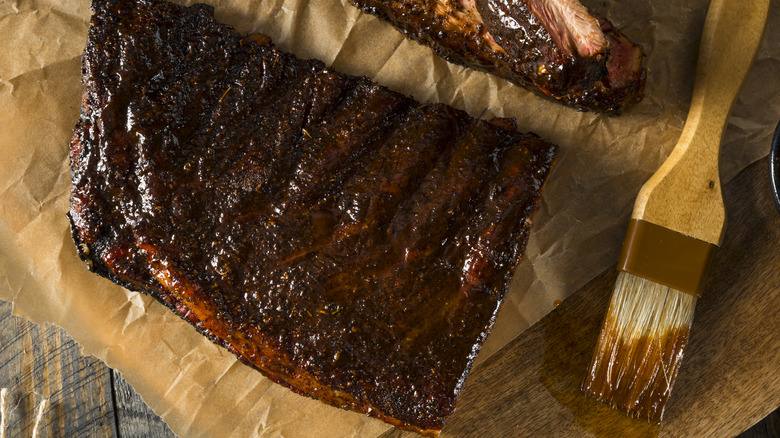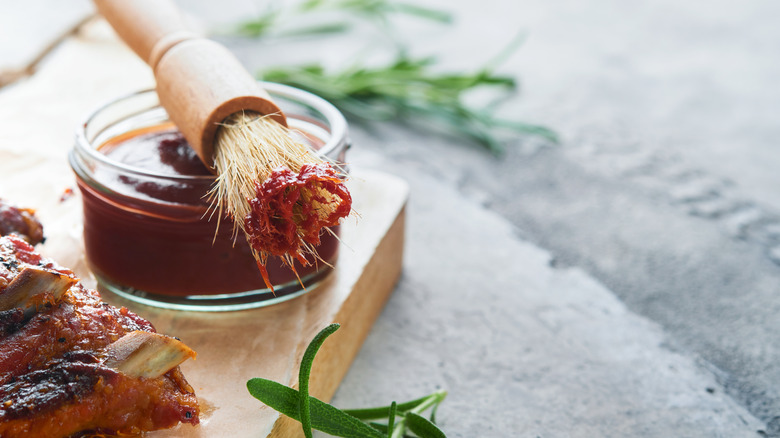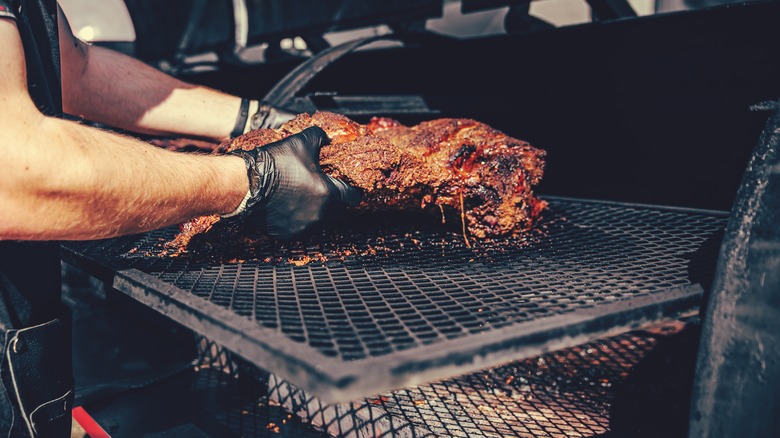Why You Should Be Wary Of Pre-Sauced Meat At Barbecue Restaurants
As the saying goes, outside of the South, barbecue is a verb: It's something you do. In the South, it's a noun — not just a cuisine, but an event — and it's fiercely regional. Barbecue looks and tastes differ from town to town, county to county, and especially state to state. While Texas has its slow-cooked brisket and St. Louis, Missouri has its ribs, differences boil down to even barbecue sauce itself. North Carolina and South Carolina may root for the same football team, but they're rivals when it comes to mustard-based versus vinegar-based barbecue sauce. Kansas City is not only a smoked meat capital, but its molasses-based sauce is one of the sweetest and thickest accompaniments around. Alabama substitutes traditional tomato-based sauce for its distinct mayo-based white barbecue sauce. But regardless of which style is your favorite, even the best sauce can't hide bad 'cue. In fact, if a restaurant's barbecue comes pre-slathered in sauce, your alarm bells should go off.
Pitmasters take great pride in the painstaking process required to produce the unique wood-smoked flavors that savants and enthusiasts value in equal measure. Making barbecue sauce may be less complicated, but its flavors are no less complex. Still, if your meats arrive coated in the stuff, there may be substandard 'cue lurking underneath.
Barbecue sauce is often used to cover up mistakes
When your barbecue sauce starts with ketchup and adds more sugar, plus garlic and Worcester sauce, the end product is bound to make just about anything taste pretty good. As Jonathan Fox, pitmaster and half of the award-winning sibling duo that runs Atlanta's Fox Bros. Bar-B-Q told Fox News about pre-sauced barbecue, "I feel like you are trying to cover something up." For example, some places might use sauce to mask tough beef ribs that haven't been cooked low or slow enough to tenderize; the zippy condiment could also be slathered on in an attempt to make up for other deficiencies, like reheated defrosted meat or barbecue that falls off the bone too easily — a sign it may have been boiled to achieve its tenderness.
Even harder to notice is liquid smoke, which mimics the taste and smell of a wood fire. Smoky barbecue sauces do such a sneakily good job hiding bad barbecue because they're infused with flavoring associated with the real stuff. To that point, meats are often seasoned with barbecue dry rubs that share many of the same spices found in sauces, like mustard and paprika, which help to form a beautiful, crusty bark. Heaps of sauce might well overpower your already flavor-packed rub, and if the 'cue is bad, even the best condiments won't be able to save it.
Pre-sauced barbecue isn't standard
Pre-sauced barbecue could very well indicate culinary fraud and conspiracy to conceal evidence, but in the end, it all comes down to the meat. Pitmaster John Lewis told Forbes, "If you do use sauce, whatever is underneath has to be a solid product. There are places in Texas that refuse to offer sauce." Indeed, why would a chef cover their labor of love with a barbecue sauce that could be store-bought? Wise up before you next sit down for some slow-smoked meats: You'll want to look for evidence of wood and a smoker, and you should be wary of menus that boast numerous regional varieties or lots of non-barbecue options. It's unlikely that the means to those delicious (burnt) ends could fit in a mall kiosk, for instance.
Barbecue is simple, but the best pitmasters create unique and delicious variations through subtle touches. As Lewis said to Forbes, "My goal is to make meat delicious without fancying it up." To him, sauce can get in the way: "We have it [sauce]. But we'd like you to first try our meats without it." A generously sauced plate might get the job done, but it makes it harder to appreciate the pitmaster's craft, which is what you — and the restaurant — should care most about.


